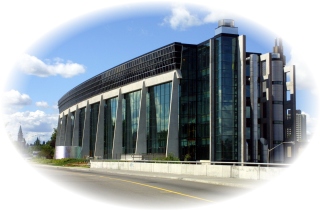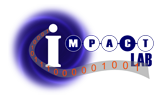|
Featured Article: Jeff Castura and Yongyi Mao, "Rateless Coding and Relay Networks," IEEE Signal Processing Magazine, September 2007A framework for coding over relay channels using rateless codes is the intersection of two active areas of research in communications; namely relay networks and rateless coding. We demonstrate that there is a very natural and useful fit between these two areas and describe some design challenges and implementation considerations for this framework. This paper is a tutorial summary of the earlier works of Castura and Mao on this subject (2005, 2006), which were the first to propose using rateless coding for cooperative communication over wireless relay networks. Click here to download the full article.
|
|
Memory of a Group OutingIn Summer 2006, we went on a three-day canoe/camping trip into the wilderness of Algonquin Park. Here is a photo capturing a moment of that trip.
|
|
Generalized Lights Out Game Created by Sean RoseHere is a Java Applet of Generalized Lights Out Game, built and copyrighted by Sean Rose (2006). Sean was a 4th year student in Computer Science, and he developed this applet in 2006 as his 4th-year project under the supervision of Professor Mao. Unlike the conventional Lights-Out game (click here for more information about the game, including how to play) )where a player can only play on a grid graph, in this generalization, the player can play the game on a graph and light configuration that he may define arbitrarily. The original idea of this generalization is due to Professor Paul Weiner. Professor Mao learned this game from Professor Weiner in the summer of 2004, where they worked together on this game for, fun of course, and for constructing some interesting algebraic error correction codes. |
|
Principles of Research, address of Albert Einstein (1918) on Max Planck's 60th Birthday"In the temple of science are many mansions, and various indeed are they that dwell therein and the motives that have led them thither. Many take to science out of a joyful sense of superior intellectual power; science is their own special sport to which they look for vivid experience and the satisfaction of ambition; many others are to be found in the temple who have offered the products of their brains on this altar for purely utilitarian purposes. Were an angel of the Lord to come and drive all the people belonging to these two categories out of the temple, the assemblage would be seriously depleted, but there would still be some men, of both present and past times, left inside. Our Planck is one of them, and that is why we love him..." Click here to read the full address. |

Welcome to IMPACT Lab @ U of Ottawa
IMPACT Lab (the Information Processing and Communication Laboratory) at the University of Ottawa is led by Professor Yongyi Mao at the University of Ottawa, School of Information Technology and Engineering. Evolving from the research group of Professor Mao, IMPACT Lab carries on advanced research in a wide spectrum of research forefronts. Research at IMPACT Lab in a nutshell deals with the processing, analysis, storage and communication of information presented in various forms. On one hand, we emphasize research that contributes to the discovery of fundamental knowledge and possesses great scientific values; on the other hand, we build practical tools, algorithms and protocols that can be potentially translated to technological products. Current research activities and interest of IMPACT Lab include wireless communications, image and video processing, source and channel coding, analysis of genomic information, as well as various theoretical research directions on information theory, statistical inference, algorithms and complexity.
The Lab is "distributed" in the form of a bunch of desktop PCs in various locations of the SITE building (800 King Edward Avenue), a powerful computer cluster somewhere in the second-floor machine room of SITE, and more importantly the brains operating these computers. The most "central" location of IMPACT Lab is actually here!
The members of the lab regularly gather in Group Meetings. There are two different kinds of Group Meetings: seminar type or course type. In a seminar-type Group Meeting, a lab member gives an informal seminar on a technical subject (typically mathematical in nature --- click here to see the seminars in previous Group Meetings). Course-type Group Meetings typically run for one whole term, where a course in advanced mathematics is studied based on a selected textbook and in each session a member will be lecturing one or several sections of the textbook.
Besides academics, there are quite a bit other Lab activities, involving food, drink, party, or picnic etc. It has been a convention that Professor Mao will open a wine in a Group Meeting to celebrate the acceptance of a student's paper to a journal (phd students) or a reputable conference (master student). To minimize his wine cost, Professor Mao always tells the lab members: publications are NOT important (but TRUE contributions are)!
